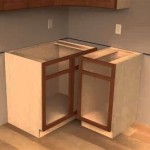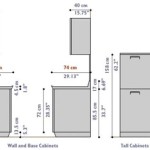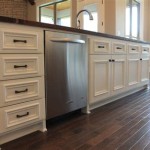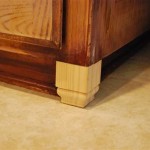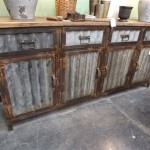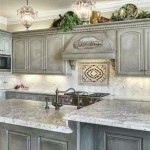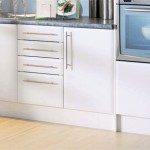Chalk Paint On Kitchen Cabinets: A Comprehensive Guide
Chalk paint has become a popular choice for revitalizing furniture and kitchen cabinets. Its matte finish and ease of application make it an attractive option for DIY enthusiasts and experienced renovators alike. This article provides a detailed overview of using chalk paint on kitchen cabinets, covering everything from preparation and application to finishing and maintenance.
The unique properties of chalk paint contribute to its widespread use. It adheres well to various surfaces with minimal preparation, often eliminating the need for priming or sanding. This characteristic makes it particularly suitable for kitchen cabinets, which can be time-consuming to prepare using traditional paint methods. Additionally, chalk paint's thick consistency allows for excellent coverage, often requiring fewer coats than other paints.
Proper preparation is crucial for achieving a professional-looking finish. Begin by thoroughly cleaning the cabinets with a degreasing cleaner to remove any grease, grime, or cooking residue. This step ensures the paint adheres correctly and prevents peeling or chipping in the future. While extensive sanding isn't usually necessary, lightly sanding glossy surfaces can improve paint adhesion. Remove hardware such as knobs, pulls, and hinges before painting. Covering countertops and surrounding areas with drop cloths or painter's tape will protect them from paint splatters.
Choosing the right chalk paint and supplies is essential for a successful project. Several brands offer high-quality chalk paints specifically formulated for furniture and cabinetry. Select a color that complements the kitchen's overall design aesthetic. Essential supplies include high-quality paintbrushes specifically designed for chalk paint, a wax or sealant for protection, and fine-grit sandpaper for distressing (if desired). Invest in good quality brushes to minimize brushstrokes and achieve a smooth, even finish.
When applying chalk paint, use long, smooth strokes in the direction of the wood grain. Apply thin coats to avoid drips and ensure proper drying. Multiple thin coats generally provide better coverage and a more durable finish than one thick coat. Allow each coat to dry completely before applying the next. Drying times vary depending on the brand of paint and the ambient humidity, so refer to the manufacturer's instructions for specific drying times.
Distressing is an optional technique used to create a vintage or antique look. After the paint has dried, lightly sand areas prone to natural wear and tear, such as edges, corners, and raised details. This technique exposes the underlying surface, adding character and dimension to the cabinets. The amount of distressing is a matter of personal preference, ranging from subtle hints of wear to a more heavily aged appearance.
Sealing or waxing the painted cabinets is essential for protecting the finish and enhancing durability. Wax provides a smooth, velvety finish and adds a layer of protection against moisture and everyday wear. Apply the wax with a clean cloth, working in small sections and following the manufacturer's instructions. Alternatively, sealants offer a more durable and water-resistant finish compared to wax. Apply the sealant with a brush or sprayer, following the product instructions carefully.
Maintaining chalk-painted cabinets is relatively simple. Regular dusting with a soft cloth will help keep them clean. Avoid using harsh chemicals or abrasive cleaners, as these can damage the painted surface. For tougher stains or spills, use a damp cloth and a mild soap solution. Reapplying wax or sealant periodically can help maintain the finish and extend the life of the paint job. The frequency of reapplication depends on the amount of wear and tear the cabinets experience.
Chalk paint offers a versatile and accessible option for updating kitchen cabinets. Its ease of application, forgiving nature, and wide range of color choices make it suitable for various skill levels. By following proper preparation and application techniques, coupled with appropriate sealing or waxing, homeowners can achieve a professional-looking, durable finish that transforms their kitchen space. Understanding the nuances of chalk paint application and maintenance empowers individuals to undertake this DIY project with confidence.
Several factors contribute to the overall cost of a chalk paint kitchen cabinet project. The brand of paint, the quantity needed, and the type of sealant or wax chosen all influence the final cost. Additional expenses may include brushes, sandpaper, and other supplies. Compared to professional cabinet refinishing, chalk paint often presents a more budget-friendly option, especially for those comfortable with DIY projects.
Troubleshooting common issues can help ensure a successful outcome. Uneven coverage can be addressed by applying additional thin coats. Peeling or chipping paint may indicate inadequate surface preparation or insufficient drying time between coats. Tackling these problems promptly can prevent further issues and maintain the integrity of the finish. Researching common challenges and their solutions beforehand can equip individuals to handle any unexpected occurrences during the project.

Painting Kitchen Cabinets With Chalk Paint Simply Today Life

Chalk Painted Kitchen Cabinets 2 Years Later Our Storied Home

How 500 And Some Chalk Paint Totally Transformed This Kitchen

How To Paint A Kitchen With Chalk Maison De Pax

Step By Kitchen Cabinet Painting With Annie Sloan Chalk Paint Jeanne Oliver

Why I Repainted My Chalk Painted Cabinets Sincerely Sara D Home Decor Diy Projects

My Chalk Painted Cabinets 4 Years Later How Did They Do Artsy Rule

Paint Your Kitchen Cabinets With Chalkboard Jessica Rayome

Chalk Painted Kitchen Cabinets 2 Years Later Our Storied Home

Painted Kitchen Cabinets Chalk Paint Well Groomed Home
Related Posts

